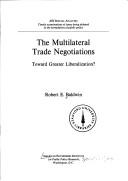| Listing 1 - 10 of 637 | << page >> |
Sort by
|
Book
Year: 1969 Publisher: Indianapolis : Bobbs-Merrill,
Abstract | Keywords | Export | Availability | Bookmark
 Loading...
Loading...Choose an application
- Reference Manager
- EndNote
- RefWorks (Direct export to RefWorks)
Book
Year: 1999 Publisher: Washington, DC : World Bank,
Abstract | Keywords | Export | Availability | Bookmark
 Loading...
Loading...Choose an application
- Reference Manager
- EndNote
- RefWorks (Direct export to RefWorks)
October 1998 Suggested guidelines for a safeguards process that emphasizes an import restriction's impact on the domestic economy: Domestically, who would benefit from the proposed restriction and who would lose, and by how much? And how would import-using interests be affected? Realizing that trade liberalization would require periodic adjustments because of problems in particular industries, GATT's framers provided that tariff reductions that led to such problems could be renegotiated; in an emergency a country could raise its tariff first and negotiate compensation with the principal exporting countries later. GATT lists many provisions that allow import restrictions, provisions that, over time, have proven quite fungible. Renegotiations were replaced by negotiated quantitative restraints (VERs), which were replaced by antidumping. The problem (troublesome imports) was always the same, but the instruments changed. And none of the instruments made much political or economic sense. They did not help a government isolate those import restrictions for which the benefits to the domestic economy would exceed the costs. And politically, the procedures through which renegotiations, VERs, or antidumping actions are decided provide a public tribune for interests that would benefit from protection but provide no voice for domestic interests that would bear the costs of restricted access to imports. Finger offers guidelines for a safeguards process that makes more economic and political sense: ° Identify the costs and losers as well as the benefits and winners. ° Be clear that the action is an exception to the principles underlying the liberalization program. Emphasize that too many such exceptions would constitute abandonment of the liberalization program and its benefits. Included in the investigation process should be an expression of the costs the proposed restriction would impose. ° Don't sanctify the criteria for the action. Procedures should not presume, as antidumping does, that there is some good reason for granting exceptions. Providing a list of good reasons invites protection-seekers to demonstrate that they qualify and places the government in the position of having to demonstrate that they do not. Procedures should stress that the function of the review is to identify the benefits, costs, and domestic winners and losers from the action requested. This paper is a product of Trade, Development Research Group. The author may be contacted at jfinger@worldbank.org.
Book
Year: 1996 Publisher: Cambridge, Mass. National Bureau of Economic Research
Abstract | Keywords | Export | Availability | Bookmark
 Loading...
Loading...Choose an application
- Reference Manager
- EndNote
- RefWorks (Direct export to RefWorks)
This paper considers tariff phase-outs in multilateral and preferential agreements. The paper finds that early GATT rounds primarily were over bindings of existing rates and that it was not until the 1962-67 Kennedy Round's 50% reduction in manufactured goods tariffs that time paths of tariff reductions became a substantive part of GATT agreements. Existing empirical work has demonstrated that U.S. industries with high initial tariffs tended to receive long periods for tariff adjustment or tended to be exempted from agreed reductions in both the Kennedy and Tokyo Rounds. This paper demonstrates that high U.S. tariffs and little intra-industry trade are associated with long NAFTA phase-out periods for U.S. imports from Mexico. Mexico's phase-outs are correlated, on the other hand, with those of the United States but not generally with Mexico's tariffs.

ISBN: 0844710822 Year: 1979 Publisher: Washington AEI for public policy research
Abstract | Keywords | Export | Availability | Bookmark
 Loading...
Loading...Choose an application
- Reference Manager
- EndNote
- RefWorks (Direct export to RefWorks)
Book
ISBN: 0191636592 0199657483 019968975X Year: 2012 Publisher: Oxford : Oxford University Press,
Abstract | Keywords | Export | Availability | Bookmark
 Loading...
Loading...Choose an application
- Reference Manager
- EndNote
- RefWorks (Direct export to RefWorks)
This is an analysis of the establishment and operation of international trade agreements, focusing on the 'General Agreement on Tariffs and Trade'. The book examines the economic rationale behind the framework of international trade, and analyses the role of trade agreements in securing the benefits of a global economy.
Book
Year: 1961 Publisher: Baden-Baden : A. Lutzeyer,
Abstract | Keywords | Export | Availability | Bookmark
 Loading...
Loading...Choose an application
- Reference Manager
- EndNote
- RefWorks (Direct export to RefWorks)
Tariff --- Tarif douanier --- General Agreement on Tariffs and Trade (Organization)
Book
Year: 1969 Publisher: Genève : [Parties contractantes du GATT],
Abstract | Keywords | Export | Availability | Bookmark
 Loading...
Loading...Choose an application
- Reference Manager
- EndNote
- RefWorks (Direct export to RefWorks)
Book
ISBN: 0900842334 Year: 1977 Publisher: London Trade policy research centre
Abstract | Keywords | Export | Availability | Bookmark
 Loading...
Loading...Choose an application
- Reference Manager
- EndNote
- RefWorks (Direct export to RefWorks)
Book
Abstract | Keywords | Export | Availability | Bookmark
 Loading...
Loading...Choose an application
- Reference Manager
- EndNote
- RefWorks (Direct export to RefWorks)
General Agreement on Tariffs and Trade (Organization) --- China --- Economic policy
Book
ISBN: 388910133X Year: 1994 Publisher: Hamburg Institut für Asienkunde
Abstract | Keywords | Export | Availability | Bookmark
 Loading...
Loading...Choose an application
- Reference Manager
- EndNote
- RefWorks (Direct export to RefWorks)
General Agreement on Tariffs and Trade (Organization) --- China --- Commercial policy.
| Listing 1 - 10 of 637 | << page >> |
Sort by
|

 Search
Search Feedback
Feedback About UniCat
About UniCat  Help
Help News
News